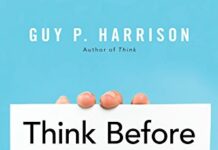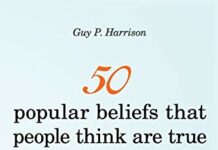
Ebook Info
- Published: 2015
- Number of pages: 290 pages
- Format: PDF
- File Size: 3.08 MB
- Authors: Guy P. Harrison
Description
Critical-thinking skills are essential for life in the 21st century. In this follow-up to his introductory guide Think, and continuing his trademark of hopeful skepticism, Guy Harrison demonstrates in a detailed fashion how to sort through bad ideas, unfounded claims, and bogus information to drill down to the most salient facts. By explaining how the human brain works, and outing its most irrational processes, this book provides the thinking tools that will help you make better decisions, ask the right questions (at the right time), know what to look for when evaluating information, and understand how your own brain subconsciously clouds your judgment. Think you’re too smart to be easily misled? Harrison summarizes scientific research showing how easily even intelligent and well-educated people can be fooled. We all suffer from cognitive biases, embellished memories, and the tendency to kowtow to authority figures or be duped by dubious ‘truths’ packaged in appealing stories. And as primates we are naturally status seekers, so we are prone to irrational beliefs that seem to enhance our sense of belonging and ranking. Emotional impulses and stress also all too often lead us into traps of misperception and bad judgment. Understanding what science has discovered about the brain makes you better equipped to cope with its built-in pitfalls. Good Thinking—the book and the practice— makes clear that with knowledge and the right thinking skills, anyone can lead a safer, wiser, more efficient, and productive life.
User’s Reviews
Reviews from Amazon users which were colected at the time this book was published on the website:
⭐Good Thinking: What You Need to Know to be Smarter, Safer, Wealthier, and Wiser by Guy P. Harrison“Good Thinking” is a first-rate and practical follow up to his previous excellent book title “Think”. Where Think was about questioning everything, Good Thinking is about presenting practical ways to lead more productive lives by leading a lifestyle that is conducive to a healthier brain. Accomplished author, historian, anthropologist and just all-around good human being Guy P. Harrison provides the public with a useful gem. This beneficial 288-page book includes the following twelve chapters: 1. The Case for Good Thinking, 2. Where do Brains Come From?, 3. Explore Your Brain, 4. Who’s Minding the Brain?, 5. Bringing Human Vision into Focus, 6. Don’t Forget How Memory Works, 7. The Shadow Brain, 8. The Enemy Within, 9. Three Crazy Things That Live in Your Head, 10. An Alternate View of Alternative Medicine, 11. Good Thinking vs. Bad Ideas, and 12. Okay, So Now What?.Positives:1. The master of clarity and dare I say good thinking. Harrison’s books are a treat to read. Well-researched and conveyed in an engaging, enjoyable fashion.2. A great topic, why good thinking is important and some easy guidelines to a healthy brain. “This book includes an expedition into the brain, specifically your brain.”3. Excellent format, professional treatment. Each chapter begins with a chapter-worthy quote, highlights important sections, and good use of photos, diagrams to complement narrative.4. A practical and useful book. There is sound and inspirational advice provided. “The invaluable bundle of critical thinking, skepticism, appreciation for science, and a basic understanding of the human brain fits nicely into one simple term: Good thinking.” “The only solution to the problem of bad thinking is good thinking and all it entails.”5. A great defender of science and reason. “Sound information is nice to have, but knowing how to think matters most.”6. Provides a list of twelve common mistakes to avoid.7. How businesses use their knowledge of the brain for profit. “For-profit cable-news companies, for example, know that scaring their viewers keeps them watching.”8. Sound research to back up points. “According to one study, Americans alone spend more than $34 billion per year on alternative medicines and therapies, most of which don’t work and some of which are dangerous.”9. The evolution of the human brain. “Once we had evolved big brains, something else unusual happened. Around 50,000 years ago, there was an explosion of cultural behaviors that we recognize today as purely human.”10. An accessible look of the brain. “Here are some things you should know about your two hippocampi. Size is the first indicator of condition. The bigger, the better is the general rule. A small or shrinking hippocampus has been associated with memory problems and Alzheimer’s disease.”11. Outstanding facts. “The blood and oxygen demands are exceptional, if not outrageous. Based on a 150-pound person, the adult brain accounts for only about 2 percent of bodyweight but requires 20 to 25 percent of the body’s blood supply.”12. Very helpful advice on how to keep a healthy brain. “Many researchers are suggesting that excessive sugar in the diet may be linked to an increased risk of depression and dementia.” Even some great advice on when it’s best to do challenging brain work, find out!13. Interesting findings regarding memories. “In short, our memories are creations that may or may not be based upon real events, and the brain’s filing system is far from ideal.” “…not only can our memories be influenced and tweaked with ease, but it is also possible to have entire memories of events that never happened “implanted” in our brains.”14. Practical societal advice. “More scientific specialized research is needed that relates directly to the use of eyewitnesses in law enforcement. Pure research efforts do not always transfer well to the criminal-law environment. “ “The IAT, introduced in 1998, can expose subconscious biases against not only racial groups but also such biases as those against sexual orientation, age, skin color, body weight, height, disability, and nationality.”15. An excellent chapter that addresses most common and problematic cognitive biases: (1) confirmation bias, (2) anchoring bias, and (3) hindsight bias.16. Putting alternative medicine in its place. “Ernst believes that the single biggest reason of all for alternative medicine’s popularity is that many of the people who sell it are very good at lying.” “The public has to rely on the authorities of scientists and science-based medical professionals.”17. The fascinating topic of conspiracies. The seven simple ways to beat bad ideas.18. Thought provoking questions that amuse me. “What if we could transfer our memories to an AI program that continues to learn and remember experiences from that point? Would this form of mental cloning qualify as immortality?”19. Explains why good thinking is important. “Good thinking can improve lives now, and it has the potential to make the world a better place for everyone.”20. Comprehensive notes and formal bibliography.Negatives:1. There is some overlap with his previous book Think.2. I was hoping for a chapter on societies that have had the most success in developing good thinking. One can come to our own conclusions but I would have been curious to know what Mr. Harrison’s perspective was.3. Being an avid reader, I’m familiar with a lot of the references made.4. I really enjoy hearing from people that confirms my own beliefs but it would also be nice to hear from those folks that I disagree with. As an example, I would have been curious to hear from those who support the homeopathic industry.In summary, this book is another wonderful addition to my library. Harrison provides sound and inspirational advice on how to lead a more rational life. I’m familiar with a lot of the material presented in this book but I always learn something new and useful. Make a sound decision and get this book, I highly recommend it.Further recommendations: “Think: Why You Should Question Everything”, “50 Popular Beliefs People Think Are True” and “50 Reasons People Give for Believing in a God” by the same author, “Critical Thinking” by Wayne Bartz, “An Appetite for Wonder” and “The Magic of Reality” by Richard Dawkins, “Demon-Haunted World” by Carl Sagan, “Faith vs Fact” by Jerry A. Coyne, “This Explains Everything” edited by John Brockman, “Nonsense: A Handbook of Logical Fallacies” by Robert J. Gula “The Science of Miracles” by Joe Nickell, “Do You Believe in Magic” by Paul A. Offit, “Tales of the Rational” by Massimo Pigliucci, “Voodoo Science” by Robert Park, “Fool Me Twice: Fighting the Assault on Science” by Shawn Lawrence, “Lies, Damned Lies, and Science” by Sherry Seethaler, and “Science Under Siege” by Kendrick Frazier.
⭐This is a very good book for general readers. As with his previous books, Guy P. Harrison’s style is very friendly and accessible, not overly complicated or difficult to grasp. The title is a bit misleading when it says “wealthier.” As Guy stresses in the book, good thinking won’t make you more money necessarily, but it can save you money by not spending it on nonsense. Just a distinction I think is worth mentioning up front.His first chapter alone is worth reading, as it makes a good case for good thinking and skepticism. Then he teaches you about the brain and common errors in thinking and why they occur. He also gives you basic information about eating nutritiously and exercising to take care of your brain’s health. He discusses how our brains can trick us visually and auditorily, how our memories aren’t all that reliable, and other logical pitfalls we’re all susceptible to. His chapter on alternative medicine is spot on and also fair and friendly. He does not come off as biased or unreasonable, here, and it’s a worthwhile read.Guy has an unstoppable enthusiasm and positivity for this stuff, and it is contagious. If you can handle him being a bit corny, particularly in the chapters on the brain early on, and if you can handle him being a little repetitive here and there, especially in the last chapter, you’ll really enjoy this book and hopefully, you’ll also get a lot out of it. I recommend his previous books, too, especially 50 Popular Beliefs That People Think Are True.http://www.amazon.com/Popular-Beliefs-That-People-Think/dp/1616144955/
⭐”Grey matter” matters in Guy P. Harrison’s latest book, ‘Good Thinking.’ With his usual insight and wit (I’ve read all of his books), Harrison explores the actual brain (don’t skip over this!) and the shadow brain, and how it makes us think, for better or worse. He looks at how we can nurture our brains in order to help us think more critically and to avoid bad thinking as much as possible. Peppered with personal examples and examples from current/past events, ‘Good Thinking’ shows us how bad, and/or irrational thinking can lead to bad ideas which can lead to bad decisions which can be dangerous and even deadly. Harrison effectively makes his case for rational thinking (and being intelligent does NOT equal rational) by using all points on the global spectrum of irrational thinking (I might add stupidity), including terrorism, racism, medical quackery, and conspiracy theories–all by-products of bad, and/or irrational thinking.’Good Thinking’ wants the reader to “help your brain help you” by thinking critically and practicing skepticism so that at the very least you’ll save time and money, and at the most, maybe even save your life or the lives of others. I say help your brain by reading this book (and by eating/drinking your green veggies!). ‘Good Thinking’ is good reading.
Keywords
Free Download Good Thinking: What You Need to Know to be Smarter, Safer, Wealthier, and Wiser in PDF format
Good Thinking: What You Need to Know to be Smarter, Safer, Wealthier, and Wiser PDF Free Download
Download Good Thinking: What You Need to Know to be Smarter, Safer, Wealthier, and Wiser 2015 PDF Free
Good Thinking: What You Need to Know to be Smarter, Safer, Wealthier, and Wiser 2015 PDF Free Download
Download Good Thinking: What You Need to Know to be Smarter, Safer, Wealthier, and Wiser PDF
Free Download Ebook Good Thinking: What You Need to Know to be Smarter, Safer, Wealthier, and Wiser



